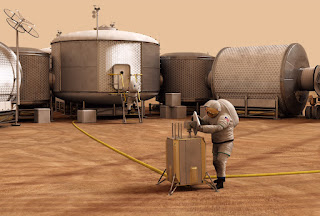Will we be colonising Mars anytime soon?
The idea of establishing a human colony on Mars has been a topic of discussion and debate for many years. While there are potential benefits to such a colony, there are also significant challenges and risks that must be considered.
One of the major concerns with establishing a human colony on Mars is the psychological impact on the individuals living there. Humans are social creatures, and living in isolation for extended periods of time can have negative effects on mental health and wellbeing. Additionally, the lack of a natural environment, such as trees and wildlife, can have a negative impact on the human psyche.Another concern is the physical toll that living on Mars would take on the human body. Mars has a harsh environment, with a thin atmosphere and high levels of radiation exposure. This could lead to a range of health problems, including increased risk of cancer, respiratory problems, and weakened immune systems.
Despite these challenges, there are several proposals for establishing a human colony on Mars. One proposal is to establish a self-sufficient colony that would rely on renewable resources for survival. This would involve developing technologies to extract resources from the Martian environment, such as water and minerals, and using these resources to produce food, oxygen, and other essentials for human survival.
Another proposal is to establish a Mars base that would serve as a research station for scientists and engineers. This base would be used to conduct experiments and develop technologies that could eventually lead to the establishment of a human colony on Mars.
Both of these proposals have their strengths and weaknesses. A self-sufficient colony would be able to sustain human life without the need for regular resupply missions from Earth, but it would require significant investment in technology development and infrastructure. A research base, on the other hand, would be less expensive to establish, but would require ongoing support from Earth to maintain operations.
Comparisons can be drawn to the challenges faced by Antarctic stations and the Biosphere 2 experiment. Antarctic stations are isolated and inhospitable environments that require significant investment in infrastructure and logistical support to maintain operations. However, these stations have been successful in supporting scientific research and exploration. However, the significant psychological strain on expedition members, and the logistical challenge of maintaining the stations, has been noted. And these are here, on Earth. The Biosphere 2 experiment, on the other hand, was an attempt to create a self-sustaining ecosystem within a closed environment, but ultimately failed due to issues with the ecosystem's balance and the psychological challenges faced by the participants. It was essentially a disaster. If we cannot maintain a closed, self-sustaining system on Earth, with healthy psychological and physical outcomes for the participants, what hope have we of maintaining a research station on Mars?So while the idea of establishing a human colony on Mars is appealing in many ways, there are significant challenges and risks that must be considered. The psychological and physical toll of living in an isolated and inhospitable environment must be carefully evaluated, and proposed solutions must be thoroughly tested and proven to be feasible before any human missions are launched.



Comments
Post a Comment